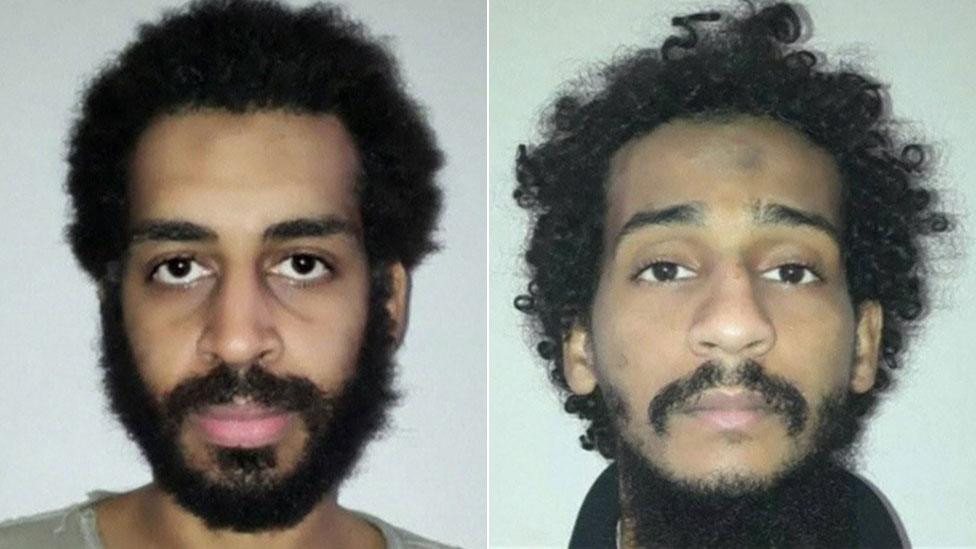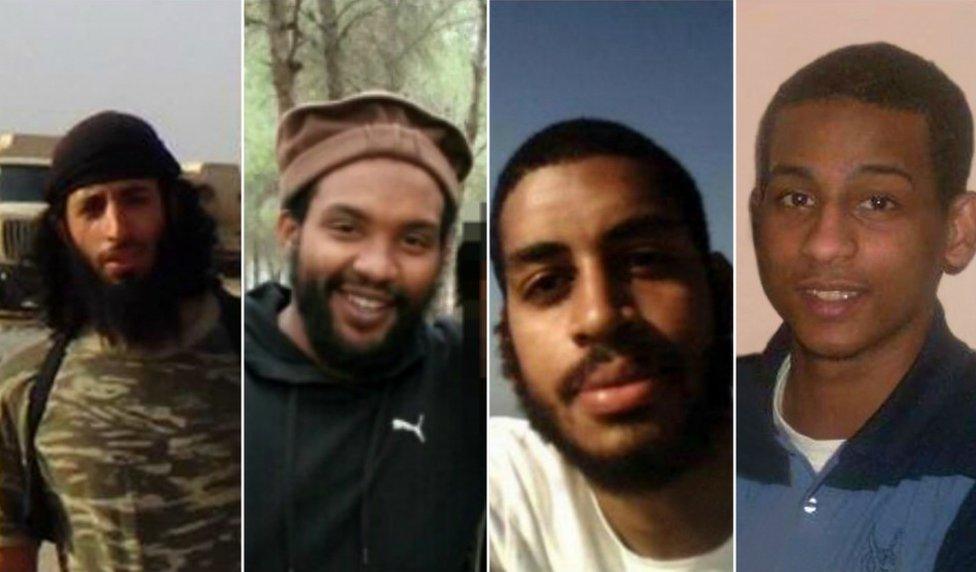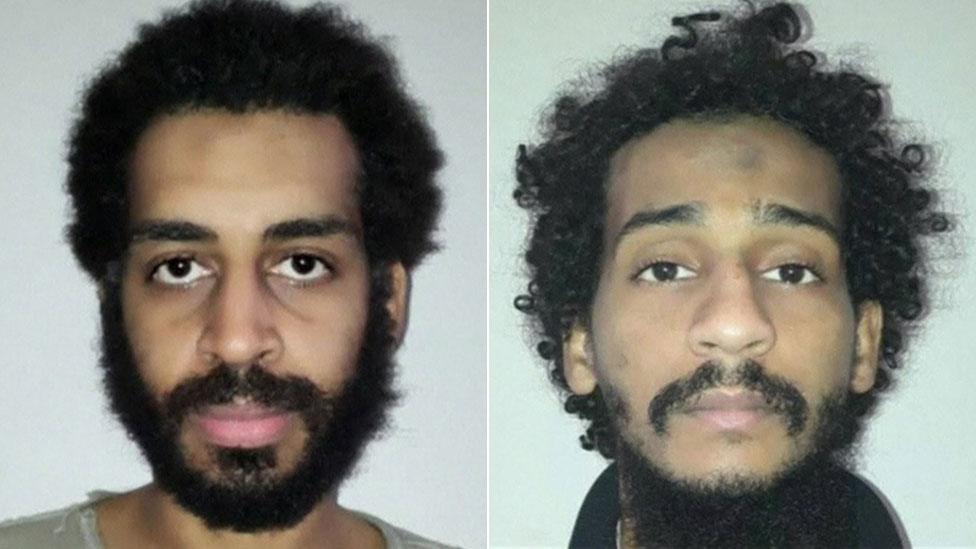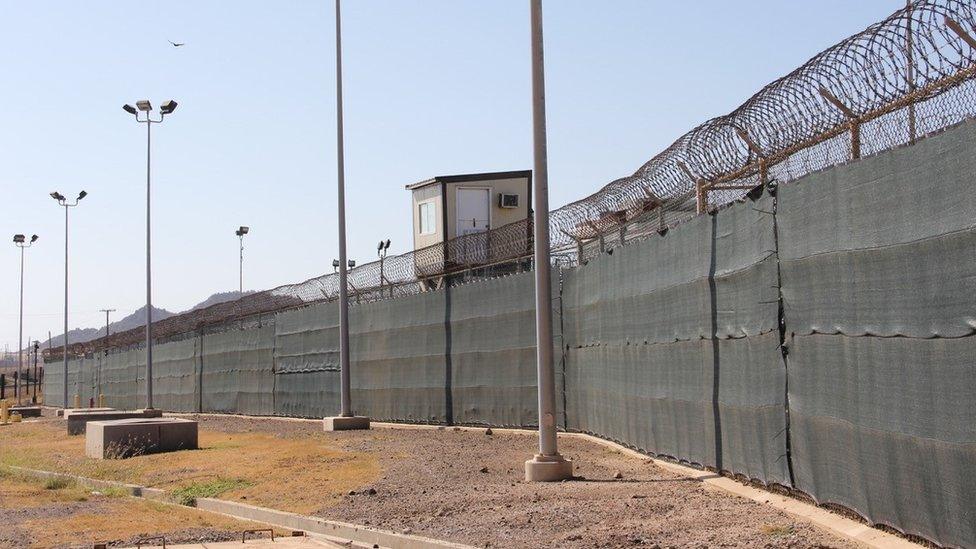Islamic State 'Beatles' duo: UK stance 'a rare decision'
- Published

Alexanda Kotey (left) and El Shafee Elsheikh were captured by Syrian Kurdish forces
The UK's opposition to the death penalty has not changed, the security minister has said - after a government letter about two IS suspects emerged.
Ben Wallace said the message from Home Secretary Sajid Javid to the US attorney general - that the UK would not "require assurances" over the death penalty - was a "rare decision".
But Labour said the UK was abandoning a "principled opposition".
The IS suspects were captured in Syria and could be sent to the US for trial.
Alexanda Kotey and El Shafee Elsheik, from London, are accused of being the last two members of an IS cell dubbed "The Beatles", which killed Western hostages.
After the pair were caught in January by US-backed Syrian Kurdish fighters they complained they would not get a fair trial because the UK government had stripped them of their British citizenship.
The UK could provide intelligence as part of the men's prosecution in the US.
For years, Britain sought assurances from foreign governments that the death penalty would not be used in cases where the UK provided information or extradited suspects.
But, in a letter leaked to the Telegraph, external, Mr Javid said he would seek no assurances about Kotey and Elsheik's sentences.
Asking an urgent question in the Commons, shadow home secretary Diane Abbott said it was not possible to be a "little bit in favour" of the death penalty.
Describing the UK stance as "abhorrent and shameful", she called on ministers "even at this late stage to reverse this decision".
Wallace and Abbott clash over death penalty and IS case
But Mr Wallace maintained ministers had complied with the European Convention on Human Rights and international law in relation to the cases.
He said: "The crimes that we are talking about involve the beheading and videoing of those beheadings of dozens of innocent people by one of the most abhorrent organisations walking this Earth.
"And simply to say if we were unable to prosecute them in this country, that we should simply let them free to roam around the United Kingdom... is simply bizarre and not justice to the victims."
Mr Wallace was challenged by MPs from all parties to explain the decision.
Former Tory attorney general Dominic Grieve said it represented a "major departure from normal policy" and the "issue is going to continue to haunt the government".
Labour's Yvette Cooper, who chairs the Commons Home Affairs Committee, said the home secretary had "unilaterally ripped up" the UK's principles, adding: "What the minister [Mr Wallace] has said today is a contradiction of the longstanding abolition of the death penalty strategy."

All part of a deal?
By James Landale, BBC diplomatic correspondent
Why might Mr Javid take this decision, in apparent breach of long-standing British policy?
Perhaps the real motivation is the government's desperation to avoid having to try these two men in Britain.
Cases like these are extremely difficult to prosecute because of the difficulty in obtaining evidence, finding witnesses, and establishing what crimes have been committed in which jurisdiction.
And in his letter, Mr Javid argues that a more successful prosecution is more likely in the US where laws are different to the UK.
What ministers and MPs believe is that Mr Javid is attempting to smooth the way for the Americans to take the cases by letting them know that the UK will not, for once, kick up a fuss about the death penalty.
In other words, this is all part of a deal.

Where does the UK stand on the death penalty?
Normally, Britain seeks assurances from foreign governments that the death penalty would not be used when the UK provided information or extradited suspects.
Number 10 said it was "a long-standing position of the government to oppose the death penalty in all circumstances as a matter of principle".
But it added that - in the case of "the Beatles" - it was "a priority to make sure that these men face criminal prosecution".
The BBC's security correspondent Frank Gardner said a senior British government official says this was not the first time that the UK had dropped its request for assurances that the death penalty would not be used - although they did not go into details.
But our correspondent said if the pair were sent to the controversial US military prison Guantanamo Bay - where some suspects have been detained for years without trial - the UK would withhold intelligence.
Amnesty International said the UK was "leaving the door wide open to charges of hypocrisy and double standards".
Who are the suspects?
Alexanda Kotey and El Shafee Elsheik were members of an IS cell known as the Beatles, because of their British accents.
The group - which included two others from west London, Mohammed Emwazi, nicknamed "Jihadi John", and Aine Davis - were radicalised in the UK before travelling to Syria.
US officials believe they beheaded more than 27 Western hostages and tortured many more.
Each was known to their hostages by their respective Beatles moniker - Paul, Ringo, John and George.

Left to right: Mohammed Emwazi, Aine Davis, Alexanda Kotey and El Shafee Elsheikh
Emwazi, who was the alleged ringleader and appeared in videos showing hostages being beheaded, was killed by a drone strike in 2015.
Davis was convicted of being a senior IS member and was jailed in Turkey last year.
UK-born Kotey is of Ghanaian and Greek Cypriot background, while Sudan-born Elsheikh came to London as a child and later became a British citizen.
- Published20 February 2018

- Published10 February 2018
